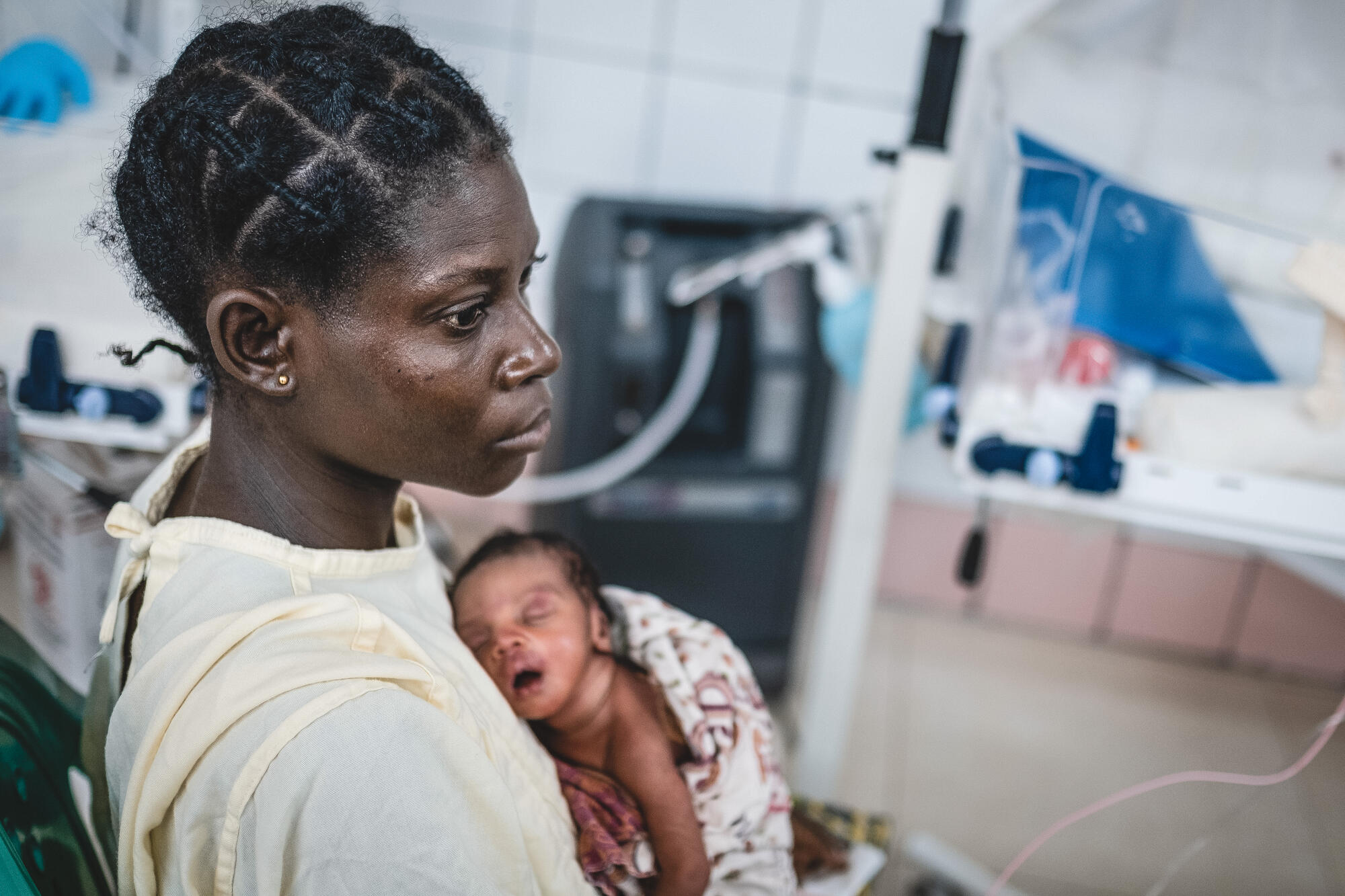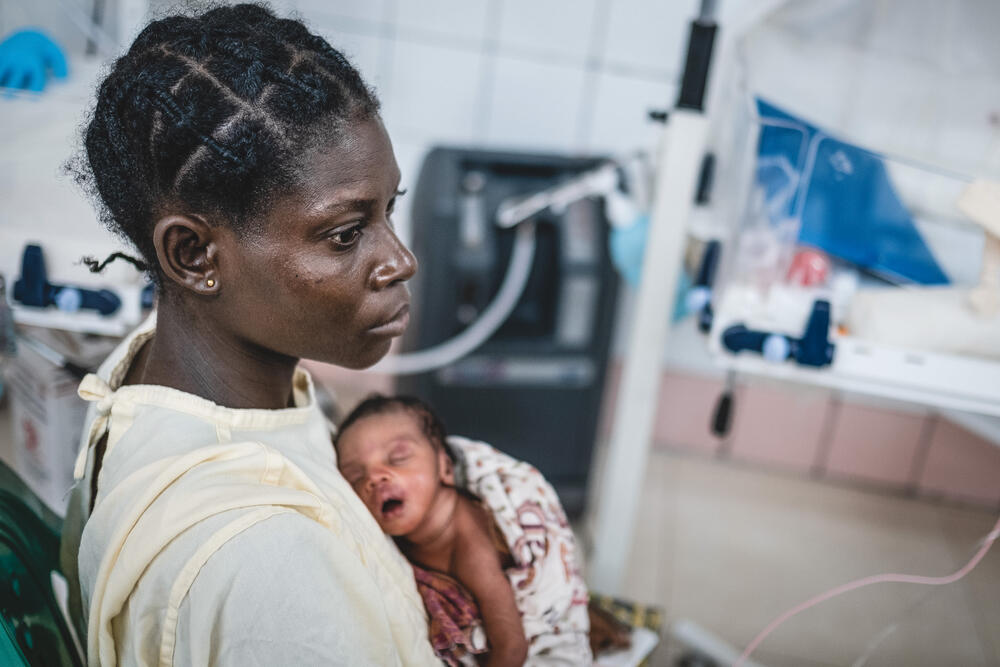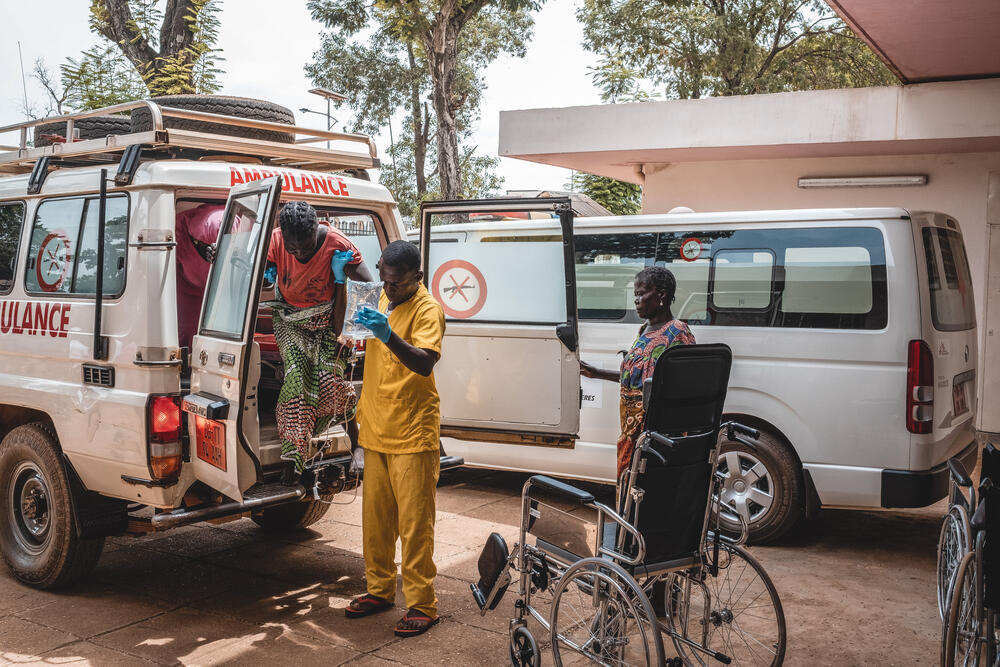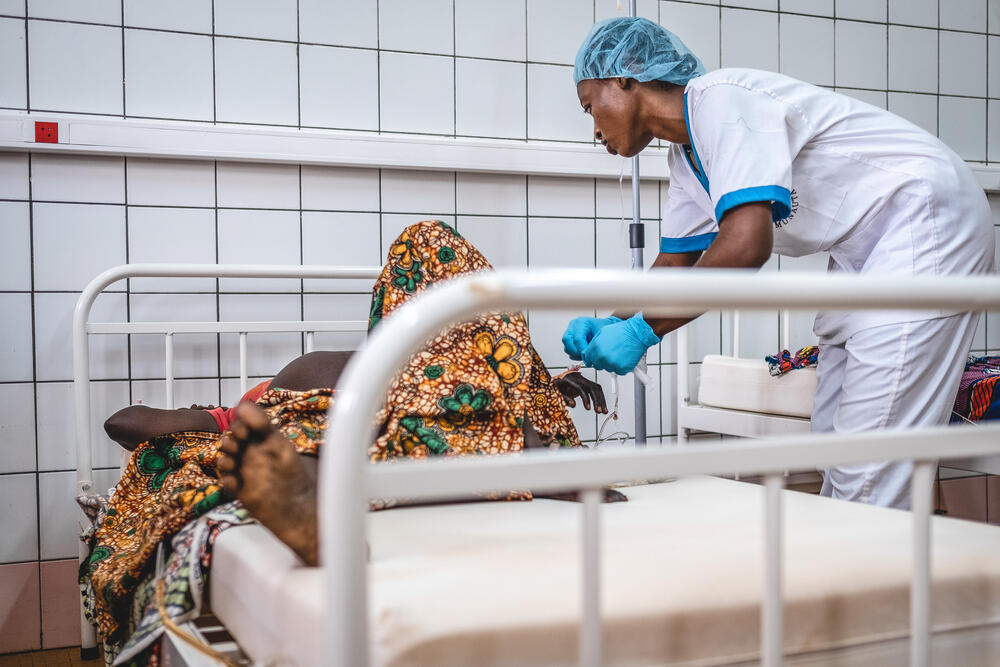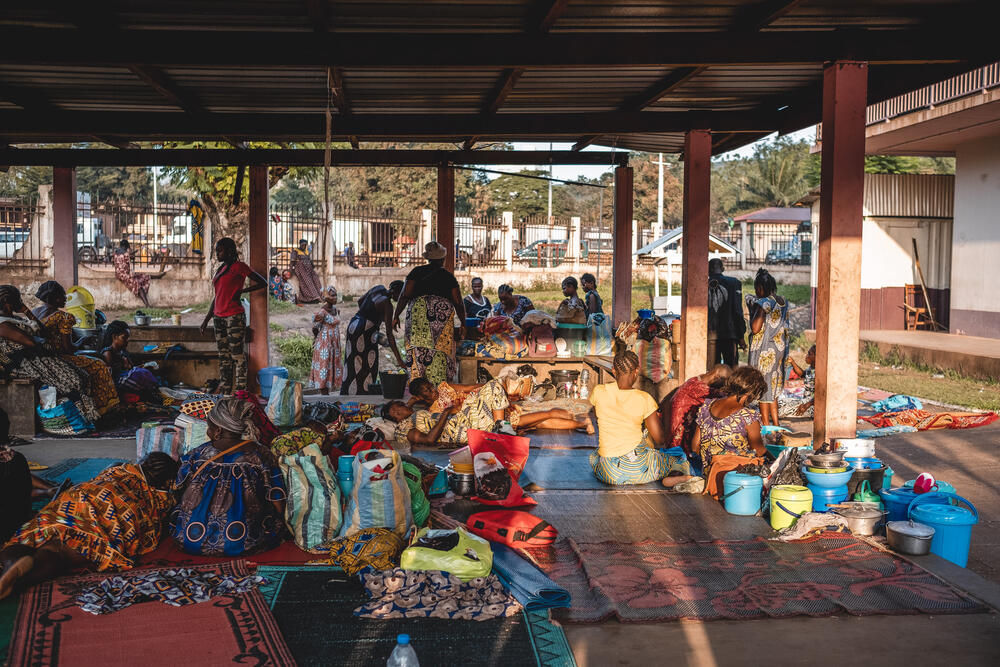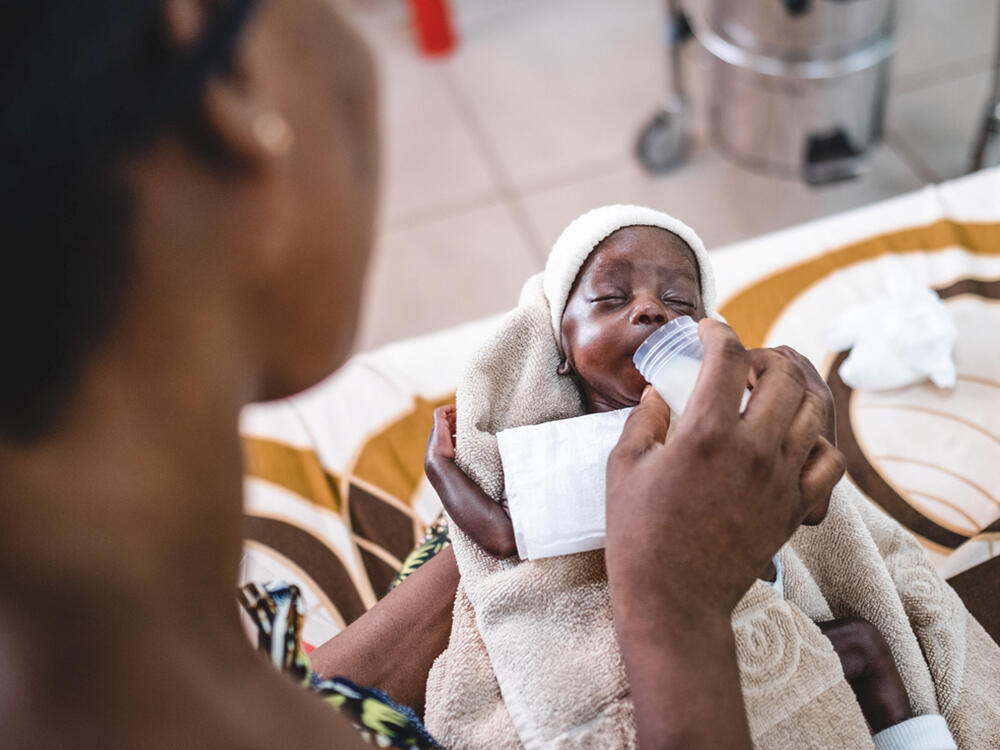Decades of instability and armed violence in the Central African Republic (CAR) have made medical care difficult to access for many pregnant women and their newborn babies.
Overshadowed by the security situation in the country, tackling this everyday emergency is a priority for Médecins Sans Frontières / Doctors Without Borders (MSF) teams.
Divine has been in labour for hours. In pain, her right hand clutches the bedpost, her left hand crumples her orange and green loincloth. Her baby is overdue, and she is exhausted.
In the maternity ward of the MSF-supported Bangui Community Hospital – known as CHUC – a nurse administers the hormone oxytocin to speed up the frequency and intensity of Divine’s contractions.
This unit is dedicated to high-risk deliveries. Women are closely monitored by medics who check their health and their baby's heart rate. If a woman’s labour goes on too long, she can be taken to the operating theatre to have a caesarean.
“There are only about 15 gynaecologists in the country, for a population of six million people”
Life-saving medical care, thanks to your support
The generosity of people like you means expert MSF teams save lives in more than 90 countries worldwide. In conflict zones, natural disasters and epidemics, we go where we are needed greatest.
However, this level of attentive care is far from common for Central African women. In a country which is severely short of health facilities and medical staff, few pregnant women have access to appropriate obstetric services.
"Many women do not go to a health centre for their delivery but give birth at home,” says Adèle Guerde-Seweïen, an MSF midwife at CHUC.
“In this situation, complications can easily lead to the death of mother or child."
An extreme situation
A scream, louder than all the other raised voices, rings out across the hospital ward. A woman has just learned of the death of her pregnant sister.
Minutes earlier, she had been rushed to hospital and taken straight to the operating theatre. Sadly, it was too late. The medical team did everything they could to stabilise her but only managed to save her baby.
"This tragedy would not have happened if she had had access to medical care in time," says Adèle.
The state of maternal and neonatal healthcare is a major emergency in CAR. The country’s maternal and child mortality rates are among the highest in the world.
According to the most recent statistics from the World Bank, women are 138 times more likely to die of pregnancy and delivery complications in CAR than in the EU. At the same time, a baby in CAR is 25 times more likely to die before its first birthday than if it had been born in Europe.
Avoidable deaths
"In CAR, to be born or to give birth is to take a risk," says Professor Norbert Richard Ngbale, an obstetrician/gynaecologist working in CHUC’s maternity and neonatology department.
"There are only about 15 gynaecologists in the country, for a population of six million people. There is a massive lack of qualified staff, especially in rural areas, where you mostly have traditional birth attendants who are not trained to detect complications.”
Most maternal deaths in CAR are related to unsafe abortions, but also to pregnancies that occur too early (when the girl is too physically immature to give birth safely) or to giving birth at home.
Many of these deaths could be avoided if healthcare services such as pregnancy support or family planning were available.
Added to this, CAR’s chronic emergency is further fuelled by extreme poverty. And, although maternal and child healthcare is officially free, too often it is only available to those who can pay.

Help us prepare for the next emergency
“In a country where 70 percent of the population lives on less than US$2 a day, every decision must be weighed up financially, even if it means putting one's health at risk," says René Colgo, Head of MSF in CAR.
"For patients, going to hospital is an expense. They don't have money to pay for antenatal care, nor transport to hospital, let alone for the delivery. Many women think it is better to go to hospital at the last minute, if at all. Supporting the provision of free care is therefore vital."
“It is unacceptable that so many women’s and babies’ lives are being lost every day for reasons that are so easily preventable"
As a mother of eight who experienced complications in childbirth with her seventh baby, Carine Dembali did not want to risk arriving too late at the hospital this time.
"With the exception of my first child, I have always given birth at home due to lack of money," she says.
"But the last time there was a problem. My baby came out but the placenta didn’t. My family rushed me to Castor’s [a hospital with a maternity ward previously supported by MSF], where I didn't have to pay anything.
“That’s why this time I wanted to avoid any risk. I went to the hospital near my home before the delivery. They saw that the cord was threatening my child and I was brought here for a caesarean.”
Kangaroo care
The maternity and neonatal wards at CHUC were fully renovated by MSF before opening in July 2022.
Staff can now offer emergency care to pregnant women and newborns in critical situations, as well as a neonatal intensive care unit. Few hospitals in the country provide a similar service.
From mid-July to mid-December, teams from MSF and the Ministry of Health cared for 3,084 pregnant women, while 860 babies were admitted to the neonatal ward, including 239 born prematurely.
Archange, who was born at just 28 weeks (compared to the normal 38-40 weeks), fought for his life for 45 days in the intensive care unit. The medical team were so impressed by his fight to survive that they nicknamed him "little general”.
"He weighed 800 grams at birth," says his mother, Stephanie.
"His twin sister unfortunately died after two weeks and I thought I was going to lose him too.”
The MSF team persuaded her to try ‘kangaroo care’, where premature babies are held close to their mother’s bodies 24 hours a day. The prolonged skin-to-skin contact keeps them warm, maintains their emotional balance and ultimately improves their chances of survival.
“When he came out of intensive care, we started the ‘kangaroo method’,” says Stephanie.
“I was stressed and not convinced. But soon I saw that he was getting better and better and that his health was improving. Today he weighs 1.5 kg. Soon I'll be able to go home with him.”
A priority for MSF
The critical situation in CAR around maternal and child healthcare has prompted MSF to launch further projects providing free emergency obstetric care in locations across the country.
MSF is also training Ministry of Health staff and renovating and equipping medical facilities so they can provide a standard of care similar to CHUC.
In 2021, our teams helped nearly 19,600 women to give birth, including 1,020 by caesarean. At the same time, 1,900 newborn babies were treated in MSF-supported neonatal units across the country.
However, more support is needed to bring these essential services to women and babies nationwide.
"The situation calls for ambitious investment by all international partners to strengthen access to reproductive health services,” says René.
“It is unacceptable that so many women’s and babies’ lives are being lost every day for reasons that are so easily preventable."
MSF and maternal health
Many women across the world give birth without medical assistance.
This massively increases the risk of complications or death. Ninety-four percent of these deaths are in low- and middle-income countries. The majority are preventable with appropriate care.
Our healthcare teams work together with pregnant women to provide delivery services, emergency obstetric care and post-delivery consultations.
